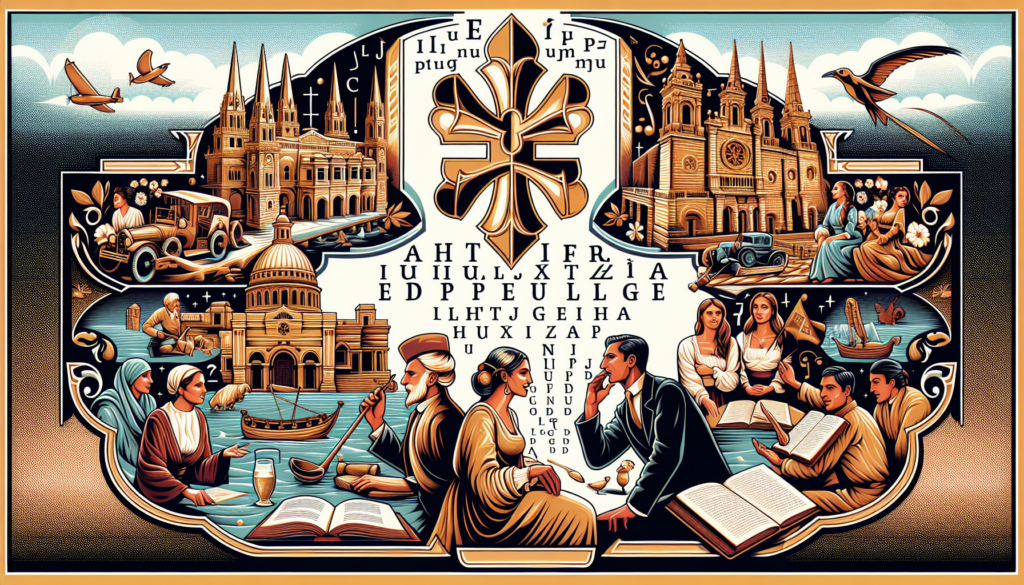Maltese, a widely spoken language in Malta, holds a fascinating history and cultural significance. Originating from Semitic roots, this unique language has evolved over the centuries, influenced by various cultures and languages. From its ancient beginnings to modern-day usage, Maltese continues to be a source of pride and identity for the people of Malta. Discover the rich meaning and significance behind the captivating language known as Maltese.
Origin and History of Maltese Language
Carthaginian Influence
The history of the Maltese language dates back to ancient times, with influences from various civilizations that have ruled over Malta throughout its history. One of the earliest influences on the Maltese language can be traced back to the Carthaginians, who arrived on the islands around the 8th century BC. The Carthaginians introduced the Phoenician language, which served as the foundation for the development of the Maltese language.
Roman Rule
Following the Carthaginians, the Romans conquered Malta in 218 BC. During this period of Roman rule, Latin gradually replaced the Phoenician language as the dominant language on the islands. Latin greatly influenced the development of the Maltese language, particularly in terms of vocabulary and grammar.
Arab Rule
In the 9th century AD, the Arab Empire invaded Malta and brought with them the Arabic language. The Arab rule had a significant impact on the Maltese language, as Arabic became the main language spoken by the local population. The influence of Arabic can still be seen in the Maltese language today, particularly in terms of vocabulary and pronunciation.
Knights of St. John
In the 16th century, the Knights of St. John, also known as the Order of Malta, ruled over the islands. Although the knights spoke various languages, including Italian, French, and Spanish, they encouraged the use of the Maltese language among the local population. This period saw the development and standardization of the Maltese language, as it became more widely used in administration and literature.
British Rule
With the arrival of the British in Malta in the 19th century, English became an official language alongside Maltese. The British influence on the Maltese language was significant, particularly in terms of education and administration. English words and expressions became more integrated into the Maltese vocabulary, further enriching the language.
Independence
Malta gained independence from British rule in 1964, and in 1974, Maltese became the sole official language of the country. This marked a significant milestone in the history of the Maltese language, as it solidified its status as the national language and allowed for greater focus on its development and preservation.
Characteristics of the Maltese Language
Semitic Language
The Maltese language is classified as a Semitic language, similar to Arabic and Hebrew. It shares many grammar and vocabulary features with these languages, including the use of triliteral roots, the absence of a verb “to be,” and the placement of the verb at the beginning of a sentence.
Influences from Other Languages
Despite its Semitic roots, the Maltese language has been heavily influenced by other languages throughout its history. This is evident in its vocabulary, which includes loanwords from Italian, French, English, and other languages. These influences have enriched and diversified the Maltese language, making it a unique fusion of different linguistic elements.
Unique Vocabulary
One of the distinct characteristics of the Maltese language is its unique vocabulary. Due to its historical influences and the blend of different languages, Maltese has developed its own set of words that are specific to the language. This includes words for local flora and fauna, cultural practices, and everyday expressions that reflect the unique identity of the Maltese people.
Phonetics and Pronunciation
The phonetics and pronunciation of the Maltese language are also notable aspects. While it is based on the Latin alphabet, Maltese has its own set of phonetic rules, which can be challenging for non-native speakers. The language includes various sounds that are not present in other languages, such as the “ċ” and “għ” sounds, which require specific vocalizations.

Maltese as the Official Language of Malta
Language Policy
Maltese holds the status of the official language of Malta, as established by the country’s constitution. The language policy in Malta emphasizes the importance of preserving and promoting the Maltese language, both as a cultural heritage and as a means of communication. Efforts are made to encourage its use in various domains, such as education, administration, and public life.
Language Education
The education system in Malta plays a crucial role in promoting the Maltese language. Maltese is taught as a subject in schools, and students are expected to be proficient in both Maltese and English. This emphasis on bilingualism reflects the importance placed on the preservation of the Maltese language while also recognizing the need for English proficiency in a globalized world.
Usage and Preservation
In everyday life, the Maltese language is widely spoken and serves as the primary means of communication among the Maltese population. It is widely used in various contexts, including social interactions, media, business, and government. Efforts are continuously made to preserve the language through the creation of linguistic resources, language institutes, and initiatives that promote its use.
Maltese Dialects
Varieties of Maltese
Maltese itself is a dialect of Arabic, known as Siculo-Arabic. However, within the Maltese language, there are also different dialects that vary based on regional differences and influences. These dialects include Gozitan Maltese, which is spoken in the sister island of Gozo, and various regional variations found within different localities in Malta.
Dialects in Different Localities
While the Maltese language is the official language of Malta, specific localities in the country have developed their own distinct dialects. These dialects often differ in terms of pronunciation, vocabulary, and grammar. The variations in dialects add to the richness and diversity of the Maltese language, reflecting the historical and cultural differences between regions.
Influence of Regional Accents
In addition to dialects, regional accents also play a role in shaping the spoken form of the Maltese language. Different regions in Malta may have their own unique accent or pronunciation patterns, which contribute to the local identity and linguistic landscape. These accents add further depth to the linguistic diversity found within the Maltese language.

Influence of Maltese in Other Languages
Loanwords
The Maltese language has influenced and contributed to other languages through loanwords. Throughout its history, Maltese has borrowed words from various languages, including Italian, English, French, and Arabic. These loanwords have been incorporated into other languages, enriching their vocabulary and reflecting the cultural interactions between Malta and other countries.
Influence on Phonetics and Grammar
The influence of the Maltese language can also be seen in the phonetics and grammar of other languages. Due to its Semitic roots, Maltese has unique pronunciation patterns and linguistic structures that have influenced the phonetics and grammar of languages such as Italian and English. This influence highlights the significance of the Maltese language as a historical and linguistic bridge between different cultures.
Significance of the Maltese Language
Cultural Identity
The Maltese language plays a vital role in defining and preserving the cultural identity of the Maltese people. It serves as a symbol of their heritage and connects them to their ancestors, who spoke similar languages throughout history. The preservation and promotion of the Maltese language contribute to the overall preservation of Maltese culture and traditions.
National Pride
As the official language of Malta, the Maltese language evokes a sense of national pride among the Maltese population. It is a tangible representation of Malta’s independence and sovereignty, as well as its unique linguistic heritage. The pride associated with the Maltese language is deeply rooted in the history and collective memory of the Maltese people.
Literary and Artistic Expression
The Maltese language serves as a medium for literary and artistic expression in Malta. Many acclaimed Maltese writers and poets have used the language to create works of literature that reflect the Maltese identity and explore the cultural nuances of the country. The expressive nature of the Maltese language allows for the articulation of emotions, ideas, and artistic visions that are deeply rooted in the local context.
Challenges and Issues Facing Maltese Language
Language Shift
One of the challenges facing the Maltese language is language shift. With globalization and increased exposure to other languages, particularly English, there is a growing tendency for younger generations to prefer English over Maltese as their primary language. This could potentially result in a decline in the use and prevalence of the Maltese language in the future.
Globalization and English Dominance
The dominance of English as the global language of business, technology, and media poses a challenge to the Maltese language. As English increasingly becomes the preferred language of communication in various domains, there is a risk of the Maltese language being marginalized and losing its relevance in the global arena. Efforts are needed to strike a balance between the promotion of English proficiency and the preservation of the Maltese language.
Language Policy and Planning
Effective language policies and planning are crucial for the long-term preservation and vitality of the Maltese language. It is essential to ensure that the Maltese language is given equal importance and support in education, media, and public life. Policies should be in place to encourage the use of the Maltese language, promote bilingualism, and provide resources for its continued development.
Language Revitalization Efforts
Promotion of Maltese Language
To address the challenges facing the Maltese language, various initiatives have been implemented to promote its use and revitalization. These efforts include public awareness campaigns, language festivals, and the establishment of language institutes that focus on teaching, researching, and documenting the Maltese language. Such initiatives aim to encourage a sense of pride in the Maltese language and increase its visibility in society.
Preservation of the Maltese Culture
The preservation of the Maltese language goes hand in hand with the preservation of Maltese culture. Cultural events, heritage sites, and cultural organizations play a crucial role in keeping the Maltese cultural identity alive. By actively promoting and preserving the cultural heritage of Malta, including the Maltese language, there is a greater chance of ensuring its sustainability for future generations.
Maltese Language in Media and Technology
Maltese Media Landscape
The Maltese language is well-represented in the media landscape of Malta. Newspapers, radio stations, and television channels in Malta offer content in Maltese, catering to the linguistic needs and preferences of the local population. This not only fosters a sense of community and identity but also allows for the continued use and development of the Maltese language in media platforms.
Use of Maltese in Digital Platforms
The rise of digital technology has provided new avenues for the promotion and use of the Maltese language. Websites, social media platforms, and mobile applications have increasingly incorporated Maltese language options, allowing for greater accessibility and engagement in the digital sphere. This integration of the Maltese language in digital platforms helps to bridge the gap between traditional and modern means of communication.
Conclusion
The Maltese language stands as a testament to the rich and diverse history of Malta. This Semitic language, influenced by various civilizations, has evolved into a unique and vibrant means of communication for the Maltese people. As the official language of Malta, it plays a central role in preserving cultural heritage, enhancing national pride, and fostering literary and artistic expression. Despite challenges posed by language shift and English dominance, concerted efforts are being made to promote and revitalize the Maltese language, ensuring its continued relevance and significance. By valuing and embracing the Maltese language, Malta safeguards its unique identity and contributes to the global tapestry of languages and cultures.
